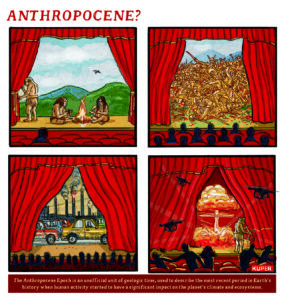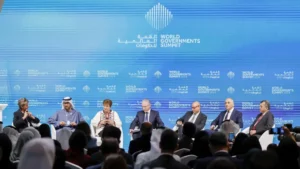Doha Climate Talks Roundup
An activist observer of the negotiations in Doha, Qatar, this week dismissed offers by developed countries as "an empty shell, an insult to our futures. There is literally no point in countries signing up to this sham of a deal, which will lock the planet in to many more years of inaction."
An activist observer of the negotiations in Doha, Qatar, this week dismissed offers by developed countries as “an empty shell, an insult to our futures. There is literally no point in countries signing up to this sham of a deal, which will lock the planet in to many more years of inaction.”
As it comes to a close, the 18th iteration of the United Nations conference of the parties on climate change has traced the steps of its predecessor talks. The holy grail of the negotiations — a binding deal to reduce carbon emissions among the conference’s member nations — remains out of reach. Smaller but still significant measures, such as money for mitigation, compensation for the damages cause by polluting countries and allocations of carbon permits, eluded negotiators as well.
And as with the other talks, developing nations are frustrated and heartbroken that richer countries refuse to take meaningful leadership in the effort to tackle climate change. “Democracy Now!” was broadcasting from Doha and captured highlights from the conference’s close below.
— Posted by Alexander Reed Kelly.
‘Democracy Now!’:
Days after a typhoon killed more than 500 of his fellow citizens, Yeb Sano, member of the Philippines Climate Change Commission, broke down Thursday while begging negotiators to do more.
“We have never had a typhoon like Bopha, which has wreaked havoc in a part of the country that has never seen a storm like this in half a century. And heartbreaking tragedies like this are not unique to the Philippines, because the whole world, especially developing countries struggling to address poverty and achieve social and human development, confront these same realities,” he said. “Please, let 2012 be remembered as the year the world found the courage to find the will to take responsibility for the future we want. I ask of all of us here, ‘If not us, then who? If not now, then when? If not here, then where?’”
Claudia Salerno, the top negotiator for Venezuela in Doha, said her main concern this year was that new commitments to the Kyoto Protocol, the only legally binding international climate agreement reached so far, will be “meaningless.” “The first thing countries need to understand when they want to succeed in the process is to understand that this is not an environmental process,” she said. “This is a process that is going to have impact in economics, so that is why it is so difficult for developed countries that are doing well economically, or even doing bad, to do the necessary changes in their economy.”
Speaking on behalf of youth around the world, 19-year-old Munira Sibai criticized world leaders for failing to take action. “Over the past two weeks, we have seen not only a complete absence of vision but also an active effort by some to move backwards,” she said. “Those who caused the climate crisis already accepted the responsibility to solve it two decades ago. Today, after 18 years of inaction, we see these same countries backing away from that obligation. The foundational principle of equity is under attack.”
Sunita Narain, Indian environmentalist and director general of the Centre for Science and Environment, said: “We strongly believe that we need a high level of ambition, we need urgent action, and we need action based on equitable sharing of the atmospheric space… So we said to the Indian government, we expect the Indian government to be hard on what the world needs and to walk out, now because I think the time for talking is gone. We need hard action.”
Tom Goldtooth, a member of the Indigenous Caucus, and executive director of the Indigenous Environmental Network, said: “There is no guarantee we are going to have a strong Doha deal coming out of here… So we’re committing, as native indigenous peoples from the United States, to go back and have highest level government to government meetings with Obama and his administration, to hold him accountable to some commitments he made on climate.”
Your support matters…Independent journalism is under threat and overshadowed by heavily funded mainstream media.
You can help level the playing field. Become a member.
Your tax-deductible contribution keeps us digging beneath the headlines to give you thought-provoking, investigative reporting and analysis that unearths what's really happening- without compromise.
Give today to support our courageous, independent journalists.









You need to be a supporter to comment.
There are currently no responses to this article.
Be the first to respond.